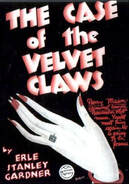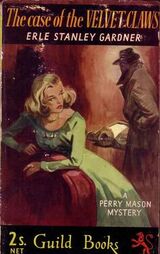
This mix of strengths and weaknesses is already fully formed and on display in The Case of the Velvet Claws, Mason's début case. What's singular about this story is that it doesn't end in a dramatic and contentious court trial like the great majority do: Mason keeps his client, an attractive femme fatale accused of shooting her husband, out of a courtroom despite the fact that Eva Belter has lied to the lawyer (and has even tried to frame him for murder!) every step of the way. George Belter is/was the publisher of Spicy Bits, a gossip tabloid largely existing as a vehicle to squeeze the rich and famous out of some money through business-legitimized blackmail. Because of this, there is a surplus of suspects who might want to see Belter dead, but Mason focuses on one in particular: Congressman Harrison Burke, last seen at a night club with a woman who was not his wife, a woman who happens to be Eva Belter herself.
So we arrive at one of Gardner's strongest qualities as an author, and the greatest personal argument for my continuing with the series. The man is quite brilliant at establishing the plotline (the hook, essentially) and guiding it along through multiple turns and reversals, escalating to a breathless climax. Such literary planning and plotting is not easy or effortless to pull off, and the three titles I have read to date – the others are The Case of the Howling Dog (1934) and The Case of the Counterfeit Eye (1935) – show no slack in their pacing or ingenuity.
Closely connected with pacing is the quality of the twists and tactics themselves. In these early adventures, Perry Mason's maneuvering would be risky in the extreme if it wasn't safely confined to Gardner's artificially created world. Gambits like altering evidence to fluster prosecution witnesses, manufacturing a fake confession to muddy the waters, and manipulating police investigation would result in disbarment many times over. Yet the cleverness of these actions and Mason's ostensibly justified motivations keep the reader flipping pages while suspending judgment. It's an impressive tightrope to walk: Mason is bending the rules, but he argues that he is just trying to even up the odds which are already stacked against his accused client.

"It's a girl expensively dressed, good looking. Seems well bred. She's in trouble, but she won't open up."
"Sulky, eh?"
"Sulky? Well, perhaps I'd call her sort of trapped."
"That's because you like her looks," Mason grinned. "If you didn't, you'd call her sulky."
…"Well, maybe she is just sulky."
 RSS Feed
RSS Feed